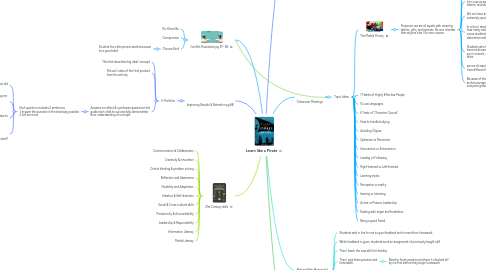
1. Conflict Resolution pg 57- 58
1.1. Ro-Sham-Bo
1.2. Compromise
1.3. Choose Kind
1.3.1. Do what the other person wants because its a good idea!
2. Improving Results & Retention pg 88
2.1. E-Portfolio
2.1.1. Title that describes big idea/ concept
2.1.2. Picture/ video of the final product from the activity
2.1.3. Answers to reflect & synthesize questions that guide each child to successfully demonstrate their understanding of concept
2.1.3.1. Each question includes 2 sentences, 1. answer the question in the best way possible 2. tell me more
2.1.3.1.1. Describe what happened? or what you did during the lesson?
2.1.3.1.2. Interpret how things went by using one (or more) oof these sets of terms - Strengths & weaknesses - Successes & setbacks
2.1.3.1.3. What have you learned due to this experience?
2.1.3.1.4. Answer one (or more) of the following questions: - what can you do to improve your learning? - How will you extend your learning past what is expected?
3. 21st Century skills
3.1. Communication & Collaboration
3.2. Creativity & innovation
3.3. Critical thinking & problem solving
3.4. Reflection and Awareness
3.5. Flexibility and Adaptation
3.6. Initiative & Self-direction
3.7. Social & Cross-cultural skills
3.8. Productivity & Accountability
3.9. Leadership & Responsibility
3.10. Information Literacy
3.11. Media Literacy
4. Responsibility Partner pg 55
4.1. Sit together and bounce ideas off each other, but come up with own products with own ideas
4.2. Redirecting Partners (Off task)
4.2.1. 1. Ask partner to do crossovers
4.2.1.1. Crossover
4.2.2. 2. Asking Partner if they need a break to get a drink of water
4.2.2.1. Usually gets them to realize they're off task and refocus
4.2.3. 3. Ask partner to move to a different classroom location to work
4.2.4. 4. Ask Partners if they want to listen to music
4.2.5. 5. if nothing else works, blame the teacher
4.2.5.1. ask partner to refocus because Mr. Hunt assigned them as RP
5. Classroom Meetings
5.1. Topic Ideas
5.1.1. The Marble Theory
5.1.1.1. Purpoose: we are all equals with amazing talents, gifts, and inerests. No one is better than anyone else. No one is worse.
5.1.1.1.1. We are all born with the same number of marbles in our brains
5.1.1.1.2. When we are born, these marbles are just in one big pile
5.1.1.1.3. Over time we allocate (seperate) these marbles into cups as we need, which represent our skills, talents, and abilities
5.1.1.1.4. We can have as may cups as we need and are extremely specialized (unique) to each individual
5.1.1.1.5. In school, teachers usually spend time evaluating how many marbles are in academic cups, which cause students to falsly assume that grades determine intelligence
5.1.1.1.6. Students who have more cups in math, science, reading become known as the "smart kids" while those who's marbles are in musical, athletic, or creative cups are not given the same titles
5.1.1.1.7. we are all equal in terms of intelligence, yet some have different talents than others.
5.1.1.1.8. Because of this we embrace failure as a learning opportunity and encourage taking risks. I give you feedback that helps everyone grow.
5.1.2. 7 Habits of Highly Effective People
5.1.3. 5 Love Languages
5.1.4. 6 Traits of "Character Counts"
5.1.5. How to handle bullying
5.1.6. Avoiding Cliques
5.1.7. Optimism vs Pessimism
5.1.8. Introversion vs Extroversion
5.1.9. Leading vs Following
5.1.10. Right-brained vs Left-brained
5.1.11. Learning styles
5.1.12. Perception vs reality
5.1.13. hearing vs Listening
5.1.14. Active vs Passive Leadership
5.1.15. Dealing with anger and frustration
5.1.16. Being a good friend
6. Making Math Meaningful
6.1. Students wait in line for me to give feedback and correct their homework
6.2. While feedback is given, students work on assignment of previously taught skill
6.3. Then I teach the new skill for that day
6.4. Then I give them practice and homework
6.4.1. Need to finish practice and have it checked off by me first before they begin homework
6.5. Whatever they don't finish will be homework for that day
6.6. Working in partners
6.6.1. Does not mean
6.6.1.1. Dividing work giving each other answers waiting for people to finish their work
6.6.2. Does mean
6.6.2.1. Doing the problems together discussing how to solve the problem discussing why they do the steps they do to solve the problem comparing answers with each other
6.6.2.1.1. Working together is a privlege in our classroom, if you abuse the privlige it will be taken away
